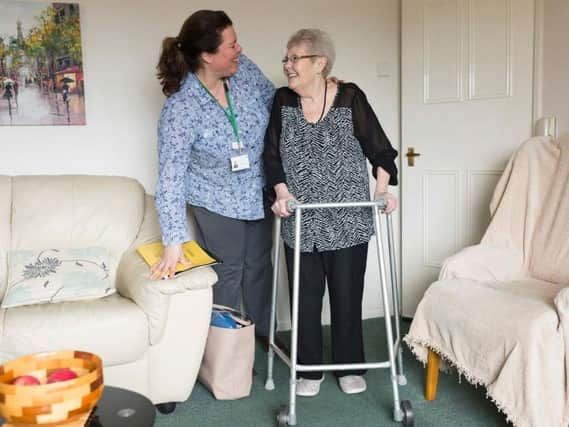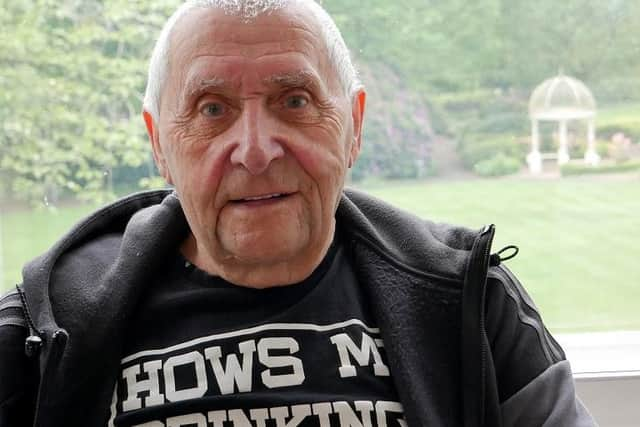Here is how St Catherine's Hospice helped a Penwortham woman who was dying of cancer prepare for her death


From making funeral arrangements and putting her affairs in order, to leaving a list of instructions for her husband to take care of himself and make the most of life – Dorothy’s plans helped the couple come to terms with her illness and enjoy quality time together before she died on April 21, aged 77.
One of Dorothy’s wishes was to die at home, and with the help of the St Catherine’s Hospice Clinical Nurse Specialists (CNS), she was able to spend her final days in the comfort of her own home with Derek by her side.
Advertisement
Hide AdAdvertisement
Hide AdHer husband, Derek, a retired plasterer and great-grandfather, is sharing their experience for the national Dying Matters campaign – an awareness initiative which focuses on the importance of opening up to family and health care professionals about death, bereavement and planning for the end of life.


The 82-year-old, from Penwortham, says: “It was always very important for us to talk about everything, and we began these conversations as soon as she was diagnosed with lung cancer three years ago.“She spoke to the whole family about how she was feeling and what she wanted, and it really helped us all. She knew she wanted to die at home, she chose the funeral directors and decided that she wanted to be cremated. “She chose her funeral songs and she wanted donations to St Catherine’s Hospice instead of flowers, because the charity did everything they could to make life easier for her, enabling her to carry on doing the things she enjoyed.
“They helped with her pain management, and she had everything she needed - like wheelchairs and a scooter - to stay at home and carrying on doing the things she loved. It meant we could still go on short breaks in our touring caravan, and we were visited a lot by our sons and grandchildren, all of which was really important to Dorothy.“She liked making lists, so she had it all planned out. Although it was hard to accept what was happening at times, it meant that everything was in place when the time came and I knew we were doing right by her, so it made a difficult time a little easier.“She’s even left me a list of ‘do’s and don’ts’ which makes me laugh – and she knew I will do as she says.”
Dorothy, a mother-of-three who had various retail jobs throughout her working life, was diagnosed with lung cancer after experiencing bad coughs. She underwent chemotherapy and radiotherapy, but Derek says she soon came to terms with how her life was changing. He adds: “The St Catherine’s CNS team helped us get organised and put things in place so that Dorothy could make the most of her time. “We already had our wills written because we spent seven years living in Spain when we retired, so we had a will for England and one for Spain. But the St Catherine’s team talked to us about a range of things and really helped us to be prepared for what was coming. They were always on the end of the phone if we needed them, and were there for us every step of the way. They were marvellous.
Advertisement
Hide AdAdvertisement
Hide Ad“Dorothy felt really lucky to have that support. They helped her live the best life she could under the circumstances. They still get in touch now to see how I am.”As well as helping Dorothy with pain management, the St Catherine’s community team taught her breathing techniques to help manage her breathlessness, and offered advice on how to be more comfortable in bed. At the time, Dorothy described the support as “very personal” and said: “It is helping me to be more independent - something which is really important to me.”
Anne-Marie Crook is one of two Hospice support assistants at St Catherine’s, who work alongside the CNS, visiting people with life-shortening conditions at home.Their job is to find out what’s important to each individual - making adjustments to their lifestyles, offering tips and advice and setting achievable goals to help them improve their quality of life.
She says: “It was a pleasure to work with Dorothy and Derek, and help Dorothy to be more comfortable at home, where she wanted to be. “At St Catherine’s, we know how important it is for people to plan for the future, to be more prepared both practically and emotionally for your own end of life, or the death of a loved one.“We encourage our patients and their families to make arrangements for things like wills, funerals, and organ donation if they wish, and to think about what’s important for them to achieve in their final months, weeks and days, such as where they wish to be cared for, and how they want to spend quality time with their loved ones.
“These questions are things for everyone to think about – not just those with life-shortening illnesses. We shouldn’t shy away from speaking to those close to us about our wishes. It can be difficult and upsetting to discuss sensitive subjects like death and bereavement, but talking about these things won’t make them happen any sooner. “What it does mean is that plans are in place for when the time comes, which we have seen can offer peace of mind to families if they know that they are doing everything their loved one wanted, and that arrangements are already in place. As Derek’s experience shows, it can make a difficult and emotional time that little bit easier.”